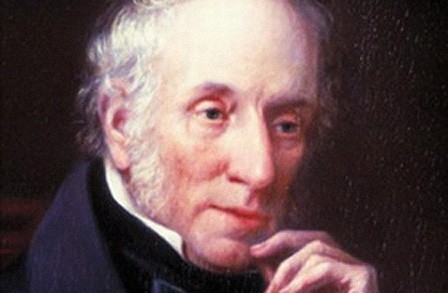
William Wordsworth (1770-1850) changed the course of English Poetry. He made its subject the internal world of man, the strivings of the mind and the sublime experience of the soul. His immediate predecessors John Dyer (1700-1758), James Thomson (1700-1748) and Thomas Gray (1716-1771) wrote nature poetry like Wordsworth, but in a rather different manner. They described the external world in a conventional stylised way, almost as a series of two-dimensional, painted scenes, in a stage set.
To the external world hints of a greater spiritual reality; trees are symbols, rocks and stones a hidden language, mountains mysterious statements made by a creator who tries to communicate with his creation. This supreme consciousness, spirit of nature, or God is present everywhere:
And I have felt
A presence that disturbs me with the joy
Of elevated thoughts; a sense sublime
Of something for more deeply interfused,
Whose dwelling is the light of setting sins,
And the round ocean and the living air,
And the blue sky and the mind of Man
A motion and a spirit, that impels
All thinking things, all objects of all thoughts
And rolls through all things.
William was part of the Romantic movement in English poetry which set itself at odds with the standards of the previous generation. Romanticism has been typically described as a condition of flux, in which imprecise yearnings, a preference for nature rather than machines, primitivism instead of civilisations and intuition rather than rationality prevails. Wordsworth however was not a typical romantic, following the cult or rebellion for its own sake. Rather he saw the dawning of a new literary epoch as a chance to liberate the stilled poetic diction of his day and create a language of men speaking to men.
‘Wordsworth is one of the few English poets to describe mystical states and his writings contain similarities with Buddhist and Yogic scripture’
Wordsworth produced a style of poetry which was psychologically persuasive and based on direct autobiographical experience. In his view poetry was a philosophical vehicle and meditative activity formed from ’emotion recollected in tranquillity.’ Above all it was a means of apprehending a natural landscape charged with divine significance.
In his nature work Wordsworth did away with allusions to classical gods and goddesses, nymphs, sprites, and heroes of Mythology. As a love of the meadows and the woods and mountains; and all that we behold’ this became the principle subject of his verse. Above all in poems such as The Prelude and Tintern Abbey Wordsworth’s poetry is the poetry of consciousness becoming aware of itself, of man using contemplation of the natural world as a means of coming to grips with his cosmic insignificance. It is a poetry of transcendence, in which the individual soul touches Divinity by putting aside the petty needs of ego and materialistic distractions- ‘The fever of the world.’
Wordsworth is one of the few English poets to describe mystical states and his writings contain similarities with Buddhist and Yogic scripture. He describes a ‘serene and blessed mood’ in which
“… the breath of this corporeal frame
And even the motion of our human blood
Almost suspended, we are laid asleep
In body, and become a living soul….”
In an epigraph before one poem he describes the child as ‘the father as the man;’ and later within the poem “Intimations of Immortality” he sets himself apart from the rational materialism of the philosopher Locke, and Locke’s belief the human mind was a blank state at birth
Our birth is but a sleep and a forgetting
The soul that rises with us, our life’s star
Hath had elsewhere its setting
And cometh from afar:
Not in entire forget fulness,
And not in utter nakedness
But trailing clouds of glory do we come
From God who is our home.
Wordsworth was not immune to human despair ‘The still sad Music of humanity’ as he called it, nor did he ignore the social pressure to conform in his poetry ‘Heaven lies about us in our infancy/ shades of the prison house begin to close / upon the growing boy’ he wrote. However, he leaves us a poetry of celebration in which consciousness reaches new heights and nature is given a new meaning. He remains a revolutionary poet, one whose concerns are not out of place in our eco-sensitive age. He will always be read with profit, the rolling cadences of his verse the repository of a rare, and marvellous vision.
From the web site ‘Knowledge of Reality’ by Caleb Williams
Leave A Comment